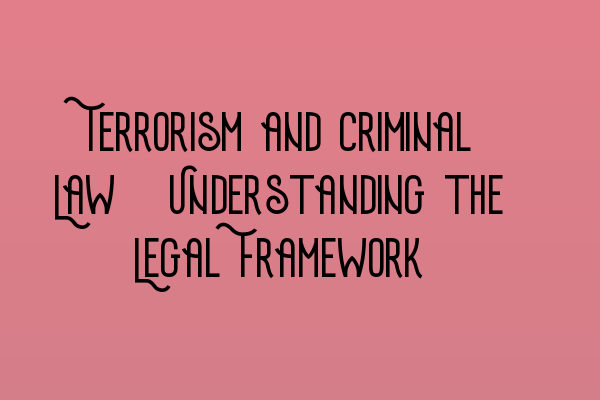Terrorism and Criminal Law: Understanding the Legal Framework
Terrorism is a grave concern in today’s world, and its impact on society cannot be underestimated. In order to combat terrorism effectively, it is crucial to understand the legal framework surrounding it. This article aims to provide a comprehensive overview of how criminal law addresses terrorism and the various legal tools available to authorities.
When it comes to tackling terrorism, criminal law plays a vital role in identifying and prosecuting those responsible for acts of terror. It provides a framework within which investigations can take place, evidence can be gathered, and trials can be conducted to deliver justice.
The Definition of Terrorism
Before delving into the legal aspects of terrorism, it is important to have a clear understanding of what constitutes terrorism. Terrorism can be defined as the use or threat of violence, often against civilians, with the intention of instilling fear, influencing government policies, or provoking societal conflict. The motives behind terrorism can vary, ranging from religious, ideological, political to criminal.
In the UK, the Terrorism Act 2000 is the key legislation that regulates and defines acts of terrorism. It provides a broad definition of terrorism, encompassing various forms and intentions behind such acts.
Legal Tools to Combat Terrorism
There are several legal tools available to authorities to combat terrorism effectively. These tools grant powers to law enforcement agencies to prevent, investigate, and prosecute terrorism-related activities.
One such legal tool is the power of surveillance. Authorities may engage in surveillance activities to gather intelligence, monitor individuals suspected of terrorist involvement, and prevent acts of terrorism. The Regulation of Investigatory Powers Act 2000 empowers law enforcement agencies to use surveillance techniques within legal boundaries.
Another crucial legal tool is the power to detain suspects. The Terrorism Act 2006 grants authorities the ability to detain individuals suspected of involvement in terrorism for up to 14 days without charge. This power, however, is subject to strict procedural and evidential requirements to safeguard civil liberties.
The use of control orders is yet another important legal mechanism used in combating terrorism. Control orders allow authorities to impose certain restrictions on individuals suspected of terrorist involvement, such as electronic tagging or curfews, to manage the risk they pose to national security.
International Cooperation
Terrorism is a global issue, and international cooperation is crucial in fighting this menace effectively. The United Kingdom actively collaborates with other nations to share intelligence, coordinate investigations, and extradite individuals involved in terrorism. This cooperation helps strengthen the legal framework and ensures that perpetrators of terrorism are brought to justice.
The Role of Criminal Lawyers
Criminal lawyers play a significant role in terrorism cases. They provide legal counsel to the accused, ensuring fair treatment and protection of their rights. Criminal lawyers also navigate the complex legal framework surrounding terrorism, ensuring that the accused receives a fair trial and that the evidence against them is scrutinized appropriately.
If you are interested in pursuing a career in criminal law, it is advisable to consider SQE 1 Practice Exam Questions and SQE 2 Preparation Courses. These resources will help you gain a comprehensive understanding of criminal law and prepare for the necessary examinations.
